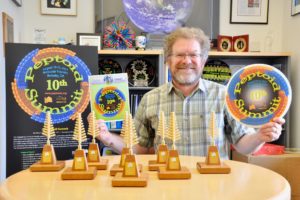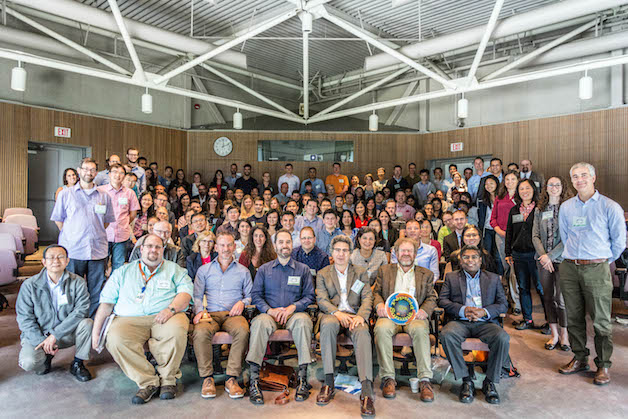Berkeley Lab’s Molecular Foundry is hosting the 10th Peptoid Summit, a gathering of students, postdocs, and other researchers who are investigating new directions in biologically inspired polymer research, focusing on synthetic chains of molecules termed “peptoids.” The conference began Thursday and ends today.
Peptoids, or “peptide-like molecules,” are human-made versions of nature’s proteins that are highly customizable and have opened up new avenues of research in a range of fields, from biomedicine to materials science. New materials made from peptoids have the structural complexity of living systems and the durability of manufactured materials.

Ron Zuckermann, a peptoid-synthesis pioneer and director of the Biological Nanostructures Facility at Berkeley Lab’s Molecular Foundry, prepares for the 10th annual Peptoid Summit at Berkeley Lab. The awards on the table, based on a peptide shape, were created by Zuckermann and Michael Stohlberg, an undergraduate research assistant at the Molecular Foundry. (Photo courtesy of Ron Zuckermann)
“We’re following nature’s example to develop functional, stable nanostructures,” said Ron Zuckermann, director of the Biological Nanostructures Facility at the Molecular Foundry. Zuckermann pioneered the field of peptoid synthesis and his team developed the first automated robotic synthesis process to facilitate their production.
The keynote address, delivered by Jonathan Clayden of the University of Bristol, highlighted how peptoids can mimick biology’s ability to encode, manipulate and communicate information across cell membranes. His research focuses on controlling the arrangement of atoms in a molecule like a light switch – in one position, the molecule is “off,” but in another, the molecule is turned “on.”
Using the structure of the protein rhodopsin, a molecule vital for human vision, as a guide, Clayden created a rhodopsin-like peptoid that when triggered by a specific chemical, emits light. He hopes to be able to use this process one day to use chemical cues outside a membrane to trigger chemical reactions within.
In hosting the Peptoid Summit at the Molecular Foundry, Lab scientists also sought to introduce visiting researchers to the facility’s capabilities. The Peptoid Summit has proven to be a fruitful place for new ideas and collaborations: A project to accurately predict peptoid structures using computer models sprang out of a past summit, for example.
This year, the summit featured an international group of 40 speakers complemented by a series of open-mic talks and poster sessions.
“It started as a small gathering of interested researchers,” said Zuckermann, who organizes the Summit, “and now we have well over 100 participants from all over the world.”
For more about peptoids:
- http://newscenter.lbl.gov/2008/07/22/nano-sized-jaws-perform-like-proteins/
- http://newscenter.lbl.gov/2010/04/12/molecular-paper/
- http://newscenter.lbl.gov/2011/01/18/nanoscale-rope/
- http://newscenter.lbl.gov/2015/04/01/a-robot-chemist-at-your-service/
- http://newscenter.lbl.gov/2014/09/03/peptoid-nanosheets-at-the-oilwater-interface/
- http://newscenter.lbl.gov/2016/03/28/peptoid-nanotubes/
